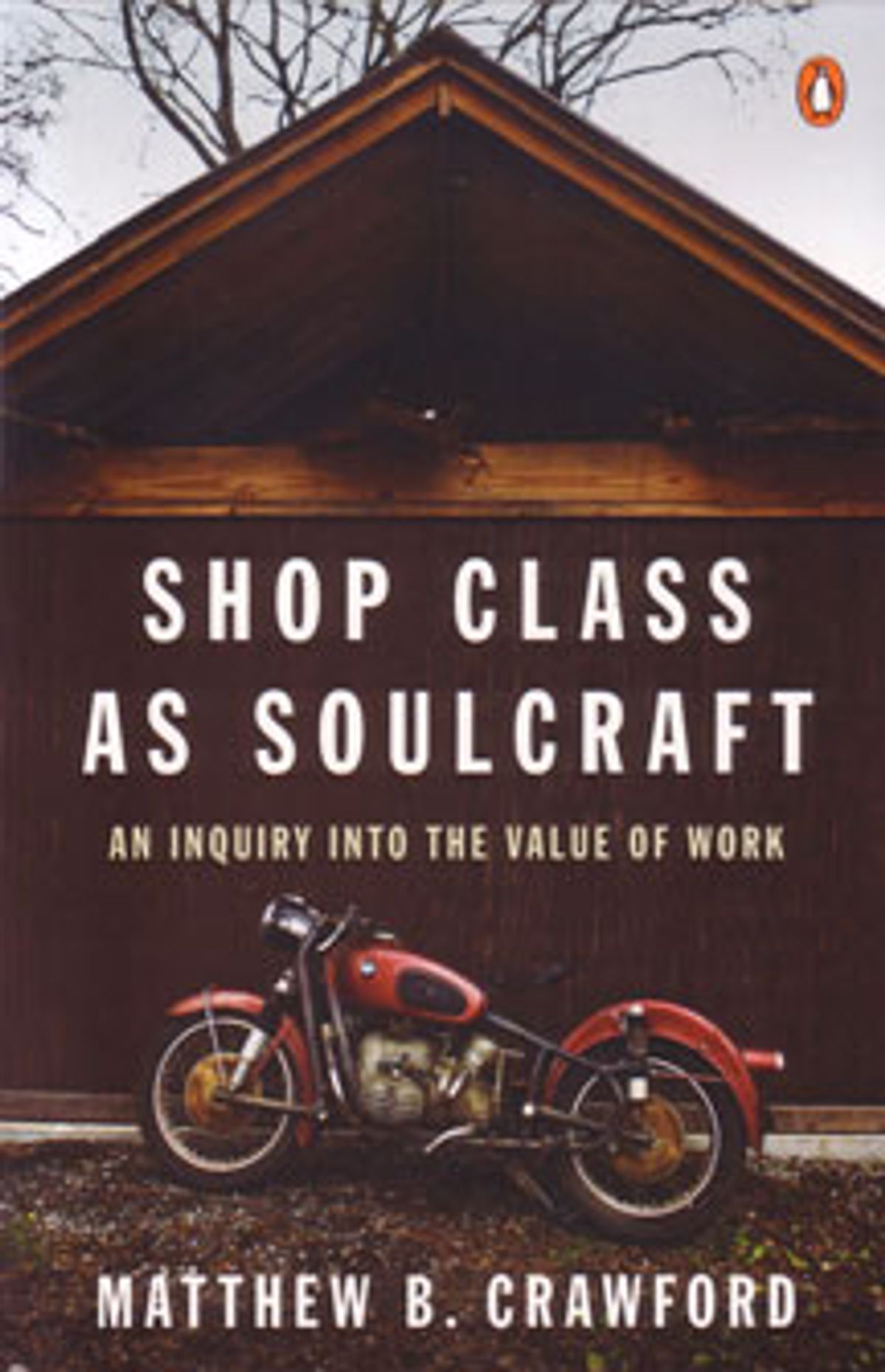Reviewed by David Schneider
I’m a self-confessed do-it-yourself junkie, so skimming the section headings in Matthew B. Crawford’s new book, Shop Class as Soulcraft: An Inquiry Into the Value of Work, whetted my appetite: ”The Cognitive Demands of Manual Work,” ”Forensic Wrenching,” ”Of Ohm’s Law and Muddy Boots,” ”The Service Manual as Social Technology.” Here, surely, was an author who would make me feel good about the amount of time I spend in my garage. But by page 70, I began to wonder whether Crawford had penned a work of flowery, highbrow prose simply to show the world that you can be an intellectual despite having—of all things!—a love for repairing old motorcycles. Robert Pirsig already proved that 35 years ago, in Zen and the Art of Motorcycle Maintenance: An Inquiry Into Values.
Let me offer an example, taken not quite at random from the first chapter:
Since the standards of craftsmanship issue from the logic of things rather than the art of persuasion, practiced submission to them perhaps gives the craftsman some psychic ground to stand on against fantastic hopes aroused by demagogues, whether commercial or political.
Would that this were an anomaly. The next couple of chapters contain such doozies as:
Identifying creativity with freedom harmonizes quite well with the culture of the new capitalism, in which the imperative of flexibility precludes dwelling in any task long enough to develop real competence.
and
The market ideal of Choice by an autonomous Self seems to act as a kind of narcotic that makes the displacing of embodied agency go smoothly, or precludes the development of such agency by providing easier satisfactions.
I began to wonder: Was I being led into the kind of trap that physicist Alan Sokal famously laid for the editor and readers of the postmodernist journal Social Text when he submitted a nonsensical manuscript? Fear not. Once you figure out how to parse him, Crawford makes reasonable sense. Still, I wondered, was it worth slogging through any more of this tedious stuff?
Then I came to a chapter titled ”The Education of a Gearhead,” in which Crawford begins to tell readers a little bit about himself. Once Crawford reins in the tendency to view the world from on high and instead just tells the story of why he chose to abandon a white-collar existence for a blue-collar one—and in particular a blue-collar one that involves a lot of grease under the fingernails—the book becomes genuinely interesting.
Crawford began working with his hands as a teenager, as I did. And, as was true for me too, the vehicle that brought him his first taste of mechanical savvy was literally a vehicle: a 1960s-era air-cooled Volkswagen. In writing about that car’s effect on his early manhood, Crawford shines. For example, ”Volkswagens in particular, as the People’s Car, tend to get passed around like cheap whores, and it is rare to fine one that hasn’t been pawed at by a train of users applying more urgency than finesse.” Brilliant. In the next chapter, ”The Further Education of a Gearhead,” Crawford does similarly well in this passage, describing a repair job on a 1983 Honda Magna motorcycle:
I smelled something burning, and discovered my pants were on fire. I was standing too close to the propane heater, in between bouts of valve cover jujitsu. The cover was still stuck where it had been a few hours ago. At this point I’d exhausted my entire lexicon of ”motherf----r”-based idioms, and I was running perilously low on slurs against the Japanese.
Crawford is not only funny, he’s also immensely perceptive—and not just within the domains of motorcycles and mechanical truisms. For example, he explains why legions of college graduates are hired into the corporate workforce with little or no scrutiny of their academic records. What matters to recruiters most is how the candidate handles him- or herself—psychological and social aptitudes—much more than whether this person knows enough to perform a useful job. No wonder we don’t make anything tangible in America anymore.
Crawford’s writing is rarely mediocre. Instead, he curiously veers back and forth between being engagingly personal (about the culture of speed shops, how a mechanic decides what he’s going to charge the customer, and the different auras that surround working with wood and with metal) and irritatingly haughty (like when he’s quoting ancient Greek philosophers or parroting his favorite academicians). The book is not an uninteresting read by any means, but be prepared for its schizophrenic feel.

